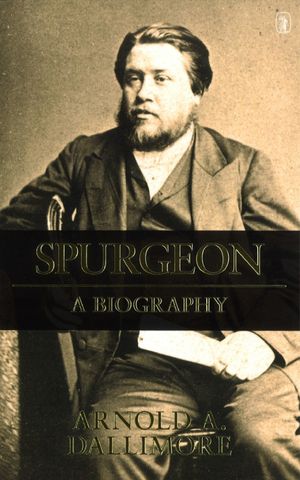Author: Arnold A. Dallimore
Publisher: Banner of Truth
250 pages
Purchase from: Banner of Truth
(£7.00)
Many Christians could write about one particular book that, under God, converted them to Christ. Many Christian ministers could write about one particular book that, under God, called them into the pastoral ministry.
However, it was chiefly good preaching during my childhood years that, under God, both converted me to Christ and called me into the pastoral ministry. Nevertheless, there is one book, apart from the Bible itself, that I have read more than any other.
Ideal introduction
Spurgeon – A biography by the late Dr Arnold Dallimore was my introduction to the man who, above all others, is my hero. It was during my teenage years that my father encouraged me to read his copy of Dallimore’s book and, very soon afterwards, I purchased my own copy and read it again. Some time later, I read it a third time!
Larger volumes are available on the life and ministry of C. H. Spurgeon. There is his two-volume autobiography and Pike’s The Life and Work of Charles Haddon Spurgeon in two volumes, both published by the Banner of Truth Trust.
From the same publishers there is also the lovely little paperback Letters of Charles Haddon Spurgeon. All these can be heartily recommended. But Dallimore’s biography was my first introduction to Spurgeon, and it still has a special place in my affections.
Preaching to thousands
Dallimore writes of Spurgeon’s birth into a Christian family in 1834, his conversion to Christ at the age of fifteen, and his beginning in the pastoral ministry when only seventeen.
He tells of Spurgeon’s call to London to pastor New Park Street Chapel at the age of nineteen, and the opening of the Metropolitan Tabernacle, accommodating some 5,500 worshippers, when he was only twenty-six years old.
Dallimore writes of Spurgeon as the husband of Susannah, the father of Charles and Thomas, a preacher, a pastor, an evangelist, a writer, and many other things besides. He tells of Spurgeon’s death in France in 1892.
Spurgeon also opened a college to train men for the pastoral ministry, and an orphanage for the care of disadvantaged children.
However, as I sit in my study only a few miles from where Spurgeon began his pastoral ministry, and only a few weeks into my own, why do I consider an appreciation of Spurgeon’s life and ministry so important today?
Private devotional life
Firstly, to appreciate Spurgeon is to appreciate the importance of our private devotional lives. There can be no doubt that Spurgeon did what he did for the Lord in public because he was who he was before the Lord in private. No amount of public service can substitute a lack of private devotion.
Primacy of preaching
Secondly, to appreciate Spurgeon is to appreciate the primacy of preaching in the work of the gospel. Spurgeon believed in preaching in general and in gospel preaching in particular.
In an age when churches will do anything rather than preach, and when many so-called preachers have so little worth saying, we must hold on tightly to the primacy of preaching. We must regularly preach the soul-saving truths of the gospel, earnestly persuading and entreating all to come to faith in Christ.
Horrifying downgrade
Thirdly, to appreciate Spurgeon is to appreciate the need to fight against the downgrade of truth and godliness. As in Spurgeon’s day, we also are in the middle of a horrifying downgrade.
Doctrine is being downgraded, with minimalist doctrinal statements being the order of the day. Worship is being downgraded, with many who claim to hold Reformed theology dear wanting to worship like Charismatics.
Like Spurgeon, we must know the times, warn against error, and work for churches that are ever purer. We must not ‘go with the flow’ or rest content with the current situation.
Lovely words
I leave you with what I think are some of the loveliest words that Spurgeon ever penned. Writing to one of his orphans, he said: ‘Dear Bray, I was so pleased with your little note. It was good of you, with all your pain, to sit up and write to me.
‘I hope when the spring weather comes you will feel better but, if not, you know of the “sweet fields beyond the swelling flood” which “stand dressed in living green”. The Lord Jesus will be very near you.
‘He feels for dear suffering children. He will keep you patient and joyful. Oh, how he loves! If there is anything you want, be sure to let me know. Your loving friend, C. H. Spurgeon.’
Jeremy Brooks









